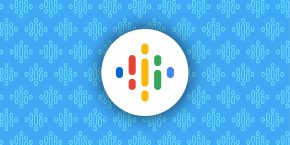
Before “Google Podcasts,” there was the ability to play podcasts in Google Search on Android. This straightforward feature was announced a few days after Google added podcasts to Play Music in April of 2016. It was rather emblematic of how Google did two of everything.
Google Podcasts officially launched in June of 2018, though it started rolling out that March. Part of the Google app on Android, it gained a straightforward homescreen that you could access via an app icon downloaded from the Play Store. You could subscribe to shows, download episodes for offline listening, and discover new podcasts, while playback was synced across other devices and Google Home.




In the months following the launch, Google added basic features like Trim silence, Cast, show/episode sharing, improved show notes, Android Auto support, sleep timer, and dark theme.
Google launched a web client in March 2019 that would take a few years to reach feature parity with mobile.
Google Podcasts and early AI dreams
At launch in 2018, the company said “Google Podcasts will be a launchpad for building an even better podcast listening experience using AI.” It imagined using speech-to-text technology for automatic subtitling — “which is especially helpful if you are hearing impaired or in a noisy area without headphones” — and then using Google Translate to bring shows to more languages.
With mass transcription, Google also talked about surfacing relevant podcast episodes as results to people’s Search queries. That came to fruition in August of 2019. At I/O that May, Google first detailed how it was indexing podcast episodes to surface audio alongside text and video results in Search. This podcast search transcribed audio to understand “what’s being talked about on a podcast,” and surfaced episodes relevant to your query in a “Podcasts” carousel.



However, Google never launched a user-facing captions UI for episodes, though we enabled a “CC” feature back in January of 2019. (As of 2024, Spotify and Apple Podcasts offer auto-generated transcriptions, while podcasts uploaded to YouTube can take advantage of the existing closed-captioning capability, though it’s not very optimized.)
Trajectory nominal
The next big mobile update was in March of 2020 with new episode notifications and auto-downloading, as well as a bottom bar redesign that consisted of Home, Search, and Activity. At the same time, the “new Google Podcasts” got an iOS app. The team emphasized it was focused on offering a simple experience to help “new users discover the wonder of podcasts.”

Other major additions in 2020 included a Manager tool for audience analytics, Play Music migration, CarPlay support, Cast improvement, and the ability to add shows via RSS if a podcaster did make a show available in Google Podcasts.
Google Podcasts kicked off 2021 with a redesigned Now Playing screen and then recommendation tuning.


The last big update came in August of 2021 to address usability complaints like a fullscreen Subscriptions page so you weren’t beholden to browsing shows with only a carousel. It took over a year from the last revamp to address that particular issue. This was part of the new Library tab that replaced Activity. This revamp only launched on Android and never made its way to iOS.




Shortly after that, Google Podcasts got a Material You redesign with Dynamic Color on Android, as well as a dual-column tablet layout.
The long goodbye
After September of 2021, feature development on Google Podcasts effectively stopped as it emerged a month later that YouTube was looking to improve its own podcasts experience.
At the start of 2023, Google Search stopped showing individual episodes in results, and replaced that functionality with a generic podcast directory that linked to third-party services.
In 2023, podcasts in YouTube Music launched and Google announced last September that Google Podcasts would be shutting down. In December, we got the April 2, 2024 deprecation date for the US.

Fundamentally, Google created a simple podcasts app that was easy to use. Its proximity to Search and the open nature of RSS should have sustained the service for the long run.
Top comment by Darren
I wish they would have kept Google Podcasts around but changed the back-end so it used the YouTube sources, and mirrored your progress. I'm sure that's easier said than done but I think it's worth having a podcasts-only app that anyone can access.
Putting them in "YouTube Music" will confuse the general public who a) think podcasts and YouTube videos are different and b) think that the app is just for music, because of its name.
However, video podcasting naturally flourished on YouTube and the company decided to consolidate efforts.
On paper, YouTube is a better home for media and content-related efforts than Google proper. For example, the move allowed a first-party podcasts solution to exist on Wear OS courtesy of the existing YTM app.
That said, I find it ridiculous that YouTube Music launched and has existed for over a year without podcasting basics like mark as played (which is coming) and new episode notifications. Google Podcasts delivered blazing fast alerts, while having to manually drag the scrubber to clear something from the “New Episodes” playlist is a preposterous hack. Looking at the landscape, YouTube Podcasts needs live lyrics-esque transcripts, while chapter support would be nice.
From an end user perspective, YouTube Music will never be as simple to use as Google Podcasts. That being said, people — and maybe even the majority — are fine with music and podcasts coexisting in one application. However, I wouldn’t say that it’s been a good start to the migration.
FTC: We use income earning auto affiliate links. More.

Comments